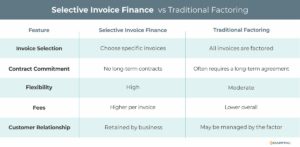
What is Selective Invoice Finance
Content
- What Is Selective Invoice Finance?
- How Does Selective Invoice Finance Work?
- Who Can Benefit from Selective Invoice Finance?
- Advantages of Selective Invoice Finance
- Challenges of Selective Invoice Finance
- Industries That Benefit from Selective Invoice Finance
- How to Use Selective Invoice Finance Effectively
- Real-World Example: Selective Invoice Finance in Action
- Tips for Choosing a Selective Invoice Finance Provider
- Conclusion
- Key Takeaways
Managing cash flow is one of the biggest challenges for businesses, particularly those dealing with long customer payment terms. Selective invoice finance provides a tailored solution, allowing companies to release cash tied up in individual invoices rather than committing their entire sales ledger. This flexibility makes it an ideal option for businesses that require occasional funding while maintaining control over their finances.
In this guide, we explore how selective invoice finance works, its benefits and drawbacks, and how businesses can use it to improve liquidity and maintain stability.
What Is Selective Invoice Finance?
Selective invoice finance, also known as single invoice factoring, allows businesses to choose specific invoices to sell to a finance provider in exchange for immediate cash. Unlike traditional invoice finance, which requires financinging the entire accounts receivable ledger, this option gives businesses full control over which invoices they finance.
Key Features of Selective Invoice Finance:
- Invoice-Specific – Businesses can choose which invoices to finance.
- No Long-Term Commitment – Ideal for businesses that need occasional access to funds without being tied into ongoing agreements.
- Flexible Access to Cash – Provides immediate liquidity without locking all accounts receivable into a finance facility.
How Does Selective Invoice Finance Work?
- Invoice Selection – The business selects a specific invoice to finance.
- Approval Process – The finance provider assesses the creditworthiness of the customer responsible for the invoice.
- Cash Advance – The provider advances a percentage of the invoice value (typically 70%-80%) to the business.
- Customer Payment – The customer pays the invoice directly to the finance provider.
- Balance Payment – The finance provider deducts their fees and releases the remaining balance to the business.
Who Can Benefit from Selective Invoice Finance?
Selective invoice finance is suitable for businesses that:
- Operate in industries with trade credit, such as manufacturing, retail, and logistics.
- Experience seasonal fluctuations in cash flow.
- Have occasional large invoices that create temporary liquidity gaps.
- Need a financing solution without long-term contracts or full-facility factoring.
Advantages of Selective Invoice Finance
- Improved Cash Flow
- Businesses receive funds quickly, allowing them to cover operational costs, payroll, or inventory purchases while waiting for customers to pay.
- Greater Flexibility
- Unlike full-ledger invoice financing, businesses choose which invoices to finance, avoiding unnecessary charges on all invoices.
- No Long-Term Contracts
- Businesses only use the service when needed, making it a cost-effective financing option.
- Maintains Business Control
- Companies retain full control over their accounts receivable while accessing funds selectively.
- Supports Growth and Investment
- The funds released can be reinvested into expansion opportunities, product development, or operational improvements.
Challenges of Selective Invoice Finance
- Higher Costs per Invoice
- Fees can be higher compared to traditional invoice financing, as this service is more flexible and ad hoc.
- Customer Creditworthiness Matters
- Approval is based on the creditworthiness of the customer rather than the business applying for finance.
- Limited Coverage
- Only approved invoices can be financed, which may not fully cover cash flow gaps.
- Additional Administration
- Businesses must actively manage the selection and submission of invoices for approval.
Industries That Benefit from Selective Invoice Finance
- Manufacturing – Helps cover supplier costs while waiting for large customer payments.
- Retail – Supports stock purchases ahead of peak sales periods.
- Logistics and Transport – Assists with fuel and wage costs while awaiting customer payments.
- Professional Services – Allows firms to manage cash flow when working with clients on long payment terms.
- Construction – Funds project-related costs where payment milestones are spread over time.
How to Use Selective Invoice Finance Effectively
- Identify Key Invoices
- Finance invoices with high values or long payment terms to maximise the benefit.
- Assess Customer Credit
- Choose invoices from creditworthy customers to increase approval likelihood.
- Plan for Costs
- Understand the fees associated with selective invoice finance to ensure it aligns with your cash flow strategy.
- Communicate with Customers
- Inform customers about the financing arrangement to prevent confusion during payment processing.
- Use It Strategically
- Leverage this facility for short-term needs while preserving other financing options for larger investments.
Real-World Example: Selective Invoice Finance in Action
Scenario:
A construction company issues a £50,000 invoice to a commercial client, with a 60-day payment term. However, the company urgently needs funds to pay subcontractors and purchase materials within the next week.
Solution:
The company uses selective invoice finance, securing an advance of 80% of the invoice value (£40,000) within a few days.
Outcome:
With immediate funds available, the construction company keeps the project on track, pays subcontractors, and ensures smooth operations. Once the client settles the invoice, the finance provider deducts their fees and releases the remaining balance.
Tips for Choosing a Selective Invoice Finance Provider
- Reputation
- Work with a provider that has a strong track record and positive client feedback.
- Transparent Fees
- Ensure all charges are clearly explained upfront to avoid unexpected costs.
- Customer Support
- Choose a provider that offers excellent communication and quick response times. Review lender’s websites to review their services and check case studies to gauge customer satisfaction.
- Efficient Approval Process
- Look for a finance company with a fast and straightforward approval process.
- Flexible Agreements
- Confirm that the provider offers true flexibility without hidden contracts or commitments.
Conclusion
Selective invoice finance is a flexible and efficient solution for businesses seeking to manage cash flow challenges without committing to long-term financing agreements. By unlocking funds tied up in individual invoices, businesses can navigate cash flow gaps, fund growth initiatives, and maintain financial stability.
If your business occasionally faces cash flow shortfalls or needs a short-term financial boost, selective invoice finance could be the perfect solution. Research reputable providers, assess your financial needs, and use this tool strategically to support your business’s long-term success.
Contact us today to discuss how selective invoice finance can help your business maintain reliable cash flow and unlock working capital.
Key Takeaways
- Cash flow management remains a major challenge for businesses, especially those dealing with long client payment terms.
- Selective invoice finance allows businesses to release cash from individual invoices, providing greater control over financing needs.
- This flexible financing tool is ideal for businesses facing occasional cash flow shortfalls, offering quick access to capital without long-term commitments.



